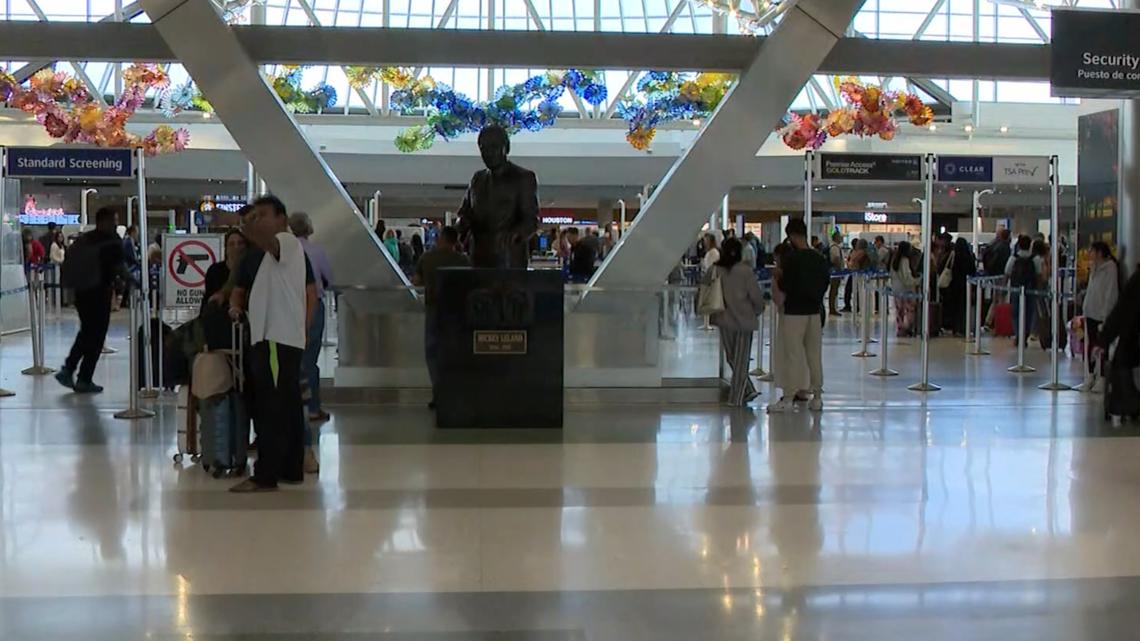If you’re flying out of Houston tomorrow, you need to see this. Airlines are making major changes at Bush and Hobby airports.
HOUSTON — The Federal Aviation Administration will begin cutting flights at 40 airports nationwide starting Friday morning, including Houston’s Bush Intercontinental and Hobby airports, as the government shutdown continues to impact air traffic controllers who have gone weeks without pay.
Houston flights affected
United Airlines is cutting 4% of its flights, which amounts to approximately 20 round trips each day out of Bush Intercontinental. Airlines began sending notifications today to passengers with flights scheduled for tomorrow from Houston airports, and travelers with weekend flights are being advised to continue checking their flight status for potential cancellations.
Southwest Airlines says passengers with canceled flights will likely be rebooked, while American Airlines reports that most of its flights remain unaffected.
Delta Airlines says it will provide customers with as much advance notice as possible about any changes to their flights.
RELATED: FAA flight reductions: How United, Southwest, Delta, and American are responding
FAA announces plan details
Thursday night, the FAA shared details on its plan to maintain safety in the skies.
“We are seeing signs of stress in the system, so we are proactively reducing the number of flights to make sure the American people continue to fly safely,” said Federal Aviation Administrator Bryan Bedford in an emailed news release. “The FAA will continue to closely monitor operations, and we will not hesitate to take further action to make sure air travel remains safe.”
The plan includes a 4% reduction in operations Friday. It increases to a 6% reduction by November 11, 8% by November 13, and 10% by November 14.
The FAA’s reduction excludes international flights. It requires airlines to decide which flights are canceled and issue full refunds. Airlines are not required to cover secondary costs.
The FAA will also limit some activities in certain airspace if there are not enough air traffic controllers available. Some pilots who are landing by visual reference, instead of with instruments, will not be allow to land. Parachute jumps and aerial photography missions may be restricted as well.
Commercial space launches may be pushed to “non-peak” hours because these launches can temporarily close large sections of airspace. Companies like Blue Origin and Space X may need to change their plans for upcoming launches.
Travel experts urge caution
Travel expert Julian Keel with Points Path recommended that travelers who don’t need to fly in the next week should consider postponing their trips.
“This is a fairly unprecedented situation and I rarely say this, but if you don’t have to travel in the next week, I’d consider moving my trip,” Keel said. “As you said, airlines are offering refunds and free changes, so if you can take advantage of that, I’d look into it, see if you could maybe fly a week or two from now instead when the situation should be a little more normal.”
Passenger rights and refunds
Passengers whose flights are significantly delayed are entitled to refunds under Department of Transportation rules. Delays of three hours or more for domestic flights and six hours or more for international flights qualify passengers for full refunds rather than vouchers or credits.
“Airlines in this case are probably going to be a little more generous and be more willing to give you that refund if you’re willing to not fly during the current period,” Keel said. “So certainly if you don’t want to fly and you want a refund, reach out to your airline, ask them for options.”
What passengers need to know
Keel noted that many passengers misunderstand their rights during travel disruptions. “A lot of passengers don’t realize that beyond the ability to get a refund, you really don’t have a lot of other compensation options,” he said. “Airlines are not required to necessarily pay for your extra time or lost work or anything like that, at least not here in the US.”
He advised travelers who must fly to be proactive by monitoring where their aircraft is coming from and whether it’s arriving late from another delay or cancellation. “Get on the phone with your airline and reach out by social media. Find a way to change before it becomes a problem,” Keel said.
Got a news tip or story idea? Email us at newstips@khou.com or call 713-521-4310 and include the best way to reach you.
